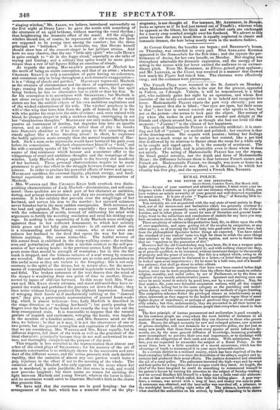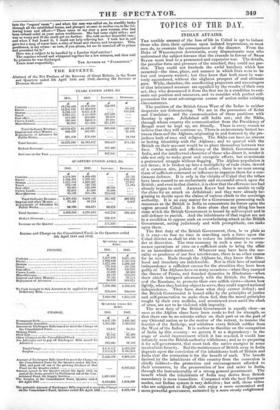RURAL POLICE.
TO THE EDITOR OF THE SPECTATOR.
Grove Street, Camden Town, 31st March 1812.
Ste—As one of your constant and admiring readers, I must crave your in- dulgence while I endeavour to point out one instance wherein, as I think, you have written an article unworthy of your general and well-deserved reputation for sound sense. It is one of your "Topics of the Day," of Saturday 26th in- stant, headed, "The Rural Police." , You certainly are not acquainted with the real state of rural society in Eng- land, nor of the meruinesses and barbarities which too generally overbear it ; but, mixing as you necessarily must, with political economists at the clubs in London, and in other places of resort for men of literature and general know- ledge, trust to the collections and conclusions of statists for any facts you may have occasion to state on the subject of that article. There are plenty of editors in this productive land, Sir, to dilate upon the evils of over-population, and upon getting rid of the surplus by emigration, or any other means ; or of coercing the whole body into good order by main force • but from the philosophical Spectator better things are expected. You have ;abed the standard of your readers' taste too high for them to relish the same things that minister to the gratification of booby squires, and serve to flatter those that are "spacious in the possession of dirt." However dull the old Constabulary may have been, Sir, it was a weapon quite sharp enough for those who had to wield it ; and with nothing sharper are they, as at present qualified, to be intrusted, without imminent danger to the security of property and the peace of society. But this is a subject which, owing to its diversified bearings:cannot be discussed in a letter,—a letter that may possibly be looked upon as an impertinence; for he must be a bold man, and of a bound- less patience, that shall go about to refute editors. Of all the fantastic presumptions that have ever been enacted before high heaven, none can be more preposterous than the efforts that are made to enforce religion, morality, and social order, by act of Parliament, or by the force or vigilance of any merely administrative power. Ignorant and starving men can never be made moral or orderly by penal laws, nor by a rural police. Nay, for that matter, Sir, your own favourite emigration notions, with all due respect be it spoken, belong but to the same category as the punishing and model- prison doings, and the various projects for improved methods of rogue-hunting. The emigration schemes flatter the privileged classes as mischievously as any other, inasmuch as they suggest to the landed monopolists vague ideas of some higher degree of importance, or perhaps of goodness they might or should pos- sibly attain ; but that, unfortunately, they are prevented in all their better in- tendments by the multitudes of common people that everywhere stand in their way. The first principle of human government and melioration is good example; for the common people are everywhere the most faithful of imitators in all matters of morality and manners which they can discover in those who govern them. Hence, the alleged necessity for new and enlarged prisons, new systems of prison-discipline, and new demands for a preventive police, are but just so many new proofs that those from whom every species of social influence de- scends, are, by the more general diffusion of knowledge, becoming gradually more incompetent to perceive their own real importance, or to discharge with due effect the obligations of their rank and station. With submission, there- fore, you are requested to reconsider the subject of a Rural Police. In the mean time, here is a little anecdote of a recent occurrence, which has the advantage of truth to recommend it to your more favourable notice. In a certain district in a midland county, which has been deprived of its due local exemplary influence ever since the demolition of the abbeys, neglect and ig- norance had produced their usual effects. The justices demanded and obtained the aid of a rural police. The policemen traversed the high-ways and by-ways and foot-paths for a long time, but not a rogue could they catch. At length, the chief of the force imagined he could do something to recommend himself to his patron's favour by turning his attention to the subject of Sunday-trading; and for several Sundays hid himself in a hedge near a little road-side alehouse. A case at last occurred which called, him from his hiding-place. A poor way- farer, a woman, was served with a mug of beer, and money was seen to pass. A summons was obtained, and the beer-seller was marched off, a prisoner, to the worshipful bench, sitting eight miles off. The prisoner, however, some- what startled the authorities on his arrival, by loudly demanding to be shown into the "rogues' room " • and when his case was called on, he sturdily broke through all the established forma, and plunged at once in niedias res, to the fol- lowing tenor and effect-" There came to my, door a poor woman, who had been refused relief at your union workhouse. She had come eight miles ; and was so weary and ill she could get no further. She told me her mournful case ; and when I had heard it, I could not help relieving her. I took her in and gave her a mug of warm beer, a slice of bread and cheese, and twopence. This, gentlemen, is my crime : so now, if you please, let me be marched off to prison and punished for it."
Bere was a subject to be handled by a London thief-catcher!
The esquires winced and whispered together for a few minutes, and then told he prisoner he was discharged.



























 Previous page
Previous page